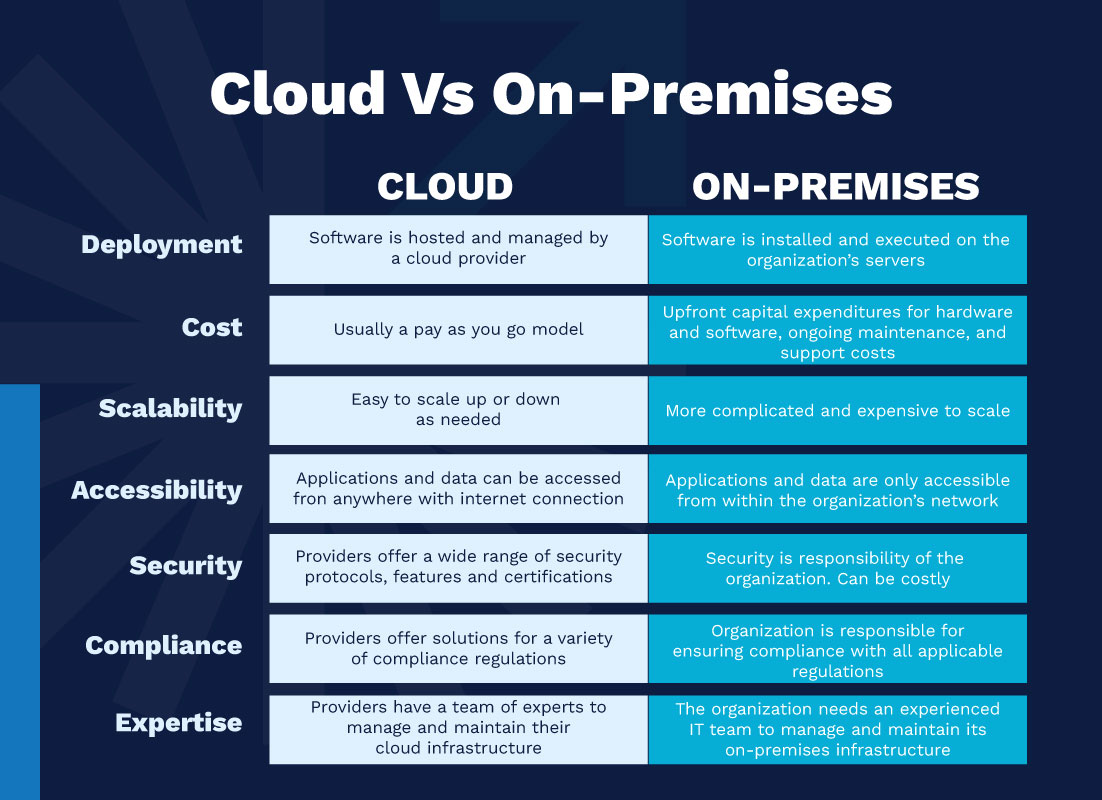As we rely on, and collect more and more digital information, data storage has become an increasing challenge for many organizations. At a high level, options boil down to on-premises and cloud-based storage. Both options have advantages and drawbacks, but cloud storage is emerging as the clear winner.
On-premise infrastructure means hosting all of your IT resources locally on your organization’s hardware. This gives you full control but requires more hands-on maintenance, more software and licensing, more expertise and more security. Cloud computing relies on third-party hosting of resources accessed remotely via the internet. It offers less control but eliminates the need for a hands-on approach.

Security
Security is of the utmost importance to any organization’s data. The security is significantly more important when handling the personal data of clients, or residents in the case of municipalities. Governments are taking a harder line with organizations that don’t adequately protect their clients’ information. Recently, jurisdictions have equated the lack of proper security with willful negligence, levying corresponding penalties and fines to match.
On premise security has several failure points.
- Damage. Physical damage, due to fire, floods, break-insAccess In-person access to servers provides opportunities for theft, sabotage
- Hardware Outdated hardware and the inability scale up or adapt
- Software Managing updates, security patches, cyber threats
- Backups With localized storage, physical damage or a complete system failure could be catastrophic
With cloud storage, experts are employed 24/7 to manage updates, address cyber threats and maintain system integrity with continuous monitoring. Regular audits and vulnerability assessments are carried out. Back ups are ongoing, securing data in the event of a catastrophic event at any one facility. Cloud storage also employs a high level of encryption to further secure information.
Cost
It is no surprise that cost is a major consideration for organizations when planning their data storage needs. On-premise storage has a high start up cost. Servers are expensive; and that’s just the tip of the iceberg. There are physical demands for physical storage including space, adequate environmental controls, and physical security. On-premises security also requires data management and security software, with enterprise licenses that can often be difficult to navigate.
For cloud-based storage, the startup costs are minimized and based on usage. Software licenses, updates and security is built in along with backups, maintenance and update of hardware. Cloud based storage also leverages economies of scale in a way that most organizations cannot.
Scaling
Adding storage space to adapt for ever-growing data demands can be difficult and costly. It may not always be physically possible to add storage to an existing facility. It may mean increasing the physical space where servers are stored, upgrading environmental controls, additional power supply and upgraded software and licensing to manage additional storage.
Scaling with cloud storage is usually based on a pay as you go subscription model. Adding more storage is often as simple as upgrading your subscription, and can be automatically implemented based on need.
Compliance
Organizations that store data on premises are responsible for being aware of and adhere to all compliance regulations. Cloud storage providers include compliance in their packages.
Expertise
On-premises storage also requires a level of expertise to manage and maintain equipment, software, licenses and ensure all compliance regulation are complied with. These considerations are included in cloud service packages.
Access
On-Premises storage limits access for employees and partners as they must connected to the local network to access information. There are other access options but they often require additional software, licenses and security.
While there are advantages to both approaches, cloud based services take the edge over on-premises storage. Many SaaS models include cloud storage as an integral part of their service, as a more efficient, secure and streamlined choice.

Bill Haralson
Business Development
Have questions about data how your data is protected? Government Frameworks helps municipalities use data to improve decisions, streamline processes, and communicate results. Want to see how your peers are tackling these challenges? We’d be happy to show you what’s working.





